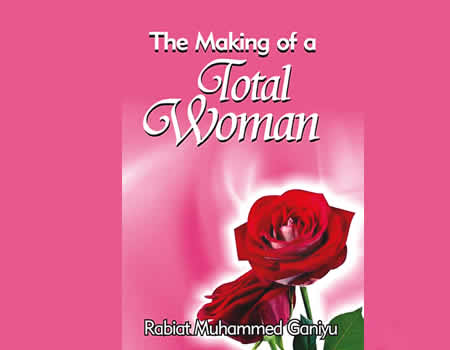THE book, The Making of A Total Woman, written by Rabiat Muhammed Ganiyu is a 78-page book, which is divided into 17 chapters with most of the chapters dealing with different but interwoven themes of feminine importance.
The book, written in third person singular, is an instructional material, a great guide towards making the female gender live a fulfilled life. If life is truly a journey, every child, especially the girl-child, has a long way to go. The journey from girlhood to womanhood is a journey of answers begging for questions, and a trip of solutions searching for problems because the road leading to a fulfilled life seems to be smooth, but it is very slippery. No star has a smooth ride to stardom.
The preface and the introduction by the author as well as the foreword by Wale Okediran succinctly open the mind of the reader to what the book is set out to offer and achieve. It is all about the trip from girlhood to motherhood and beyond.
From there, the theme and sub-themes of the book explode across the page with instructional, persuasive and warning words which are skillfully combined by the author to form the directional guide for women on the road to a fulfilled life. Chapter one, ‘The Girl-Child’, which starts with the birth of the girl-child, deals extensively with issues around the boy-child preference as they affected his female counterpart in ancient times. But in modern times, the slogan is, ‘What a man can do, a woman can even do better’.
In chapter two, ‘The Fiancée’, the girl-child has become a lady. The author uses this chapter to guide all ladies who are aspiring to enter into a marital life to be cautious. The guide includes dos and don’ts of the process of choosing a suitor perhaps from the pool of suitors. In all, the young lady should involve God as her guide in the selection process. In other words, the author is telling the reader that the safer sex for unmarried couples is no sex.
From chapter three to chapter five, the author paints the expected scenarios that a woman will encounter from the wedding day till she becomes a bride and settles down as the chief executive officer for home affairs if her husband is wealthy or the managing director of home affairs if her husband has meager resources.
What will initially strike the reader in chapter five is the way the author enjoins every wife to adore and respect her husband. Here she sounds like Marabel Morgan, the author of a successful non-fiction book entitled, ‘Total Woman’, published in 1973 in the USA. It sold over 500,000 copies within 365 days. By the end of 1974, it had sold over 10 million copies worldwide.
On page 58 of the book, Marabel Morgan admonishes that a wife should honour, adore, praise, enjoy and admire her husband. The only difference between Morgan’s perspective and that of Rabiat is in the manner of dressing. While both authors enjoin the wife to ‘dress to kill’ for her husband, Rabiat quickly adds, ‘she should wear only decent clothes when going out’.
‘Decent clothes’ is not in Morgan’s book. Even the dress to kill philosophy in Morgan’s book goes beyond what Rabiat charges every wife for. For example, Morgan advocates for a wife greeting her husband at the door naked. But the crucial message in these two great books is that both authors are trying to save many marriages from hitting the rock.
As a realist, Rabiat strikes a controversial chord on the issue of polygamy when she enjoins every Muslim wife to admit the fact that her husband may marry other women and prepare for the eventuality because ‘A Muslim man is permitted to marry up to four wives’. Quran 4, verse 3 however adds, ‘But if you fear that you will not be able to deal with all of them equally, then confine yourself only to one’ (Quran 4, verse 3).
ALSO READ: Thinking of our women and daughters
The travails, challenges and joy of motherhood are extensively covered from chapter 8, ‘The New Mother’ to chapter 12, ‘The Working Mother.’ The new mother breastfeeds her child, lacks sleep in the process of caring for her child, suffers from soreness, experiences baby blues that has to do with negative feelings or mood swings, may have postpartum depression, struggles to get back in shape and may be under intense pressure of returning to work. Every mother needs to have an eagle eye to be able to protect her daughter from peadophiles.
The last three chapters directly link the power and the roles of women to community and national development. If a woman can create new but good values in her husband, if a woman can create new but good values in her children, if a woman can create civic values in her community, logically she can create new but good values in a nation.
The strength of this book lies in the fact that it is a product of qualitative research based on observations and experiences. Every moral issue that the book powerfully pushes to the reader can be seen, proved and touched.
This will make every woman to see herself in the book. It will make the girl-child to cautiously climb the hill of childhood and view the outcrop of delightful womanhood that tells a tale of joyful pain, and a tale of painful joy. The book comprehensively presents a load of knowledge that screams at ignorance.
However its weak point, which is very difficult to notice, is the repetition of ideas necessitated by the author’s urge to lay emphasis.
Rabiat Muhammed Ganiyu’s ‘The Making of A Total Woman’, written in lucid language, a must read for every woman, man, parent and teacher provides answers to these questions.




